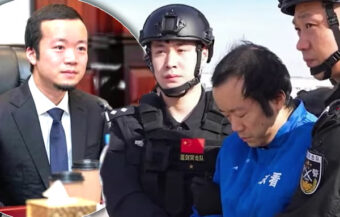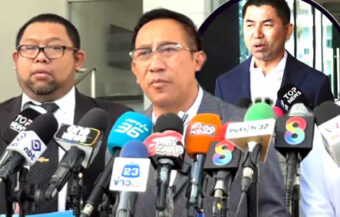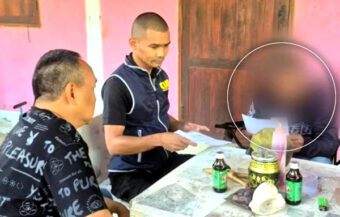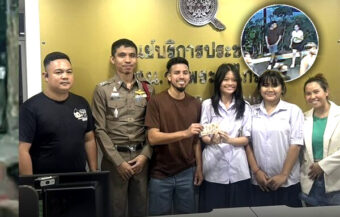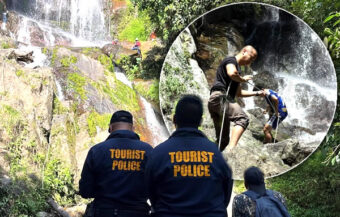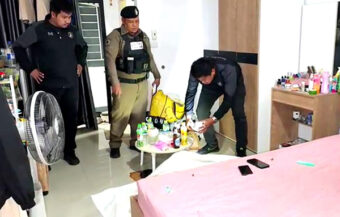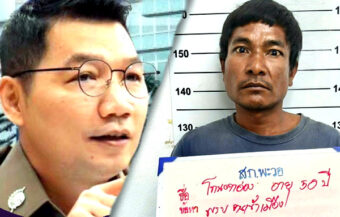Thai soldier loses foot in blast near Cambodia, promoted to Sergeant with ฿1M payout. Army probes if the Russian mine was newly planted. Officials warn of cross-border sabotage as three more PMN-2 mines found in a cleared zone. Public urged to await official communiqués.
On Thursday, the Royal Thai Army moved quickly to recognise a soldier who lost his foot in a landmine blast near the Cambodian border. Lieutenant General Boonsin Phadklang, Commander of Army Region 2, promoted the wounded soldier to Sergeant and approved a compensation package worth over ฿1 million, along with a monthly pension close to ฿30,000. The explosion occurred Wednesday evening on Hill 481 in the Chong Bok area of Ubon Ratchathani—an area previously declared mine-free. In response, army investigators launched a 2–3 day probe to determine whether the Russian-made device was a leftover from past conflicts, a repurposed mine and newly planted weapon—possibly by Cambodian forces.
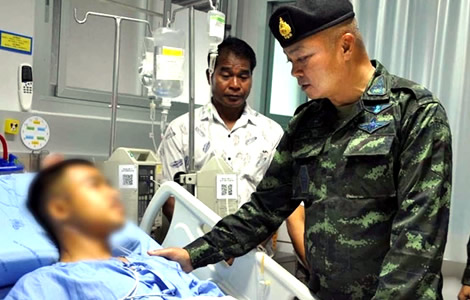
Military authorities are urging the public to remain alert and wait for the official findings. The investigation is now a matter of national security.
The Royal Thai Army is urgently investigating a landmine explosion that injured three soldiers near the Thai-Cambodian border. The blast occurred on July 16 during a patrol operation in Chong Bok, Ubon Ratchathani. The incident left one soldier, Private First Class Thanapat Huiwan, with a severed left foot.
The soldiers were patrolling from the Morakot Operations Base to Hill 481 at 1:30 p.m. The operation took place in an area previously declared free of landmines. However, the explosion raised serious concerns that new mines may have been planted.
Mine appeared newly planted despite earlier clearance, prompting EOD probe and heightened concerns
Initially, army reports suggested the mine might be a remnant from past conflicts. But later assessments indicated otherwise. In fact, evidence collected by Explosive Ordnance Disposal (EOD) teams suggested the mine was recently deployed.
Moreover, photographic evidence supports this conclusion. The area had been cleared and certified safe by the Mine Countermeasures Unit. Yet, after the explosion, three more PMN-2 anti-personnel mines were found nearby. Therefore, this discovery has triggered heightened alarm within military ranks.
The mine that caused the injury has been identified as a Russian-made PMN-2. These mines weigh 15.9 ounces and contain 4.1 ounces of COM PB explosives, including TNT. They detonate under pressure and can maim or kill instantly. The triggering weight is around 1,111 pounds. Crucially, they are made of plastic, which makes detection difficult.
According to army experts, the PMN-2 is not used by Thai forces. Instead, it was previously used by Vietnamese and Cambodian troops. Thailand does not stock this mine, which points to possible foreign involvement. Significantly, Thailand and Cambodia both ratified the 1999 Ottawa Convention, which bans such mines.
Second PMN-2 mine found one day earlier raised suspicions about recent planting and cross-border risk
On July 15—one day before the explosion—another PMN-2 mine was found during a drill patrol. It was located at coordinates 48P WA 21507 86176. That mine was safely removed. However, this second incident confirmed fears that mines may have been newly planted.
Following the July 16 explosion, the three injured soldiers were evacuated quickly. Private First Class Thanapat Huiwan’s left foot was blown off at the ankle. He received immediate first aid, oxygen, and intravenous fluids. A helicopter transported him to Sunpasitthirasong Hospital in Ubon Ratchathani.
Meanwhile, the other injured soldiers—Sergeant Patiphant Srilasak and Private Nathawut Srikhem—suffered chest injuries. Fortunately, both are now stable and recovering. The army has assured that all necessary medical and psychological support is being provided.
On July 17, Lieutenant General Boonsin Phadklang, Commander of Army Region 2, visited Pvt. Thanapat in hospital. He praised the soldier’s bravery and awarded him a battlefield promotion. As a result, Thanapat was promoted from Private First Class to the rank of Sergeant.
Thai army grants wounded soldier full pension, medal and job security for his sister as official heir
Furthermore, the army announced a comprehensive support package. Sgt. Thanapat will receive a monthly pension of ฿15,600. When combined with other military and government assistance, the total is expected to reach ฿29,800 monthly. In addition, he will receive a lump sum of over ฿1,047,000.
The commander also confirmed that Thanapat’s sister will be appointed as his official heir in civil service. This means she will be entitled to a secure government position. Moreover, after medical discharge, Thanapat will be eligible to apply for employment support under Section 35 of Thai law. This includes benefits under both clauses (3) and (7) of that section.
In recognition of his service, Sgt. Thanapat has been awarded the Freedom Defenders Medal, Class 2, Category 1. He has also received a Veterans Card, Class 3. Therefore, this card entitles him to lifetime discounts on electricity, water, and public transport.
Lieutenant General Boonsin instructed Army Region 2’s personnel division to ensure all rights and benefits are fully granted. He emphasised the army’s responsibility to care for its wounded. In his words, “Those who sacrifice for the country must never be forgotten.”
Ongoing probe focuses on forensic evidence and mine origin in the historically volatile Emerald Triangle
While the welfare response was swift, the broader security implications remain under scrutiny. According to army spokesman Major General Winthai Suvari, full results from the forensic investigation are expected in two to three days. The EOD team is analysing evidence from the site, including blast patterns and mine construction.
Importantly, this area is not random. Chong Bok sits in the Nam Yuen District, part of the so-called Emerald Triangle. This region borders Thailand, Cambodia, and Laos. It has a long history of military conflict. In the 1970s, Vietnamese forces clashed with Khmer Rouge troops here. Thai forces were also drawn into the battles.
Although both Thailand and Cambodia have signed the Ottawa Convention, tensions remain high. In fact, on May 28 this year, Thai and Cambodian troops exchanged gunfire in the same border area. That clash resulted in one Cambodian soldier killed and sparked the present conflict.
In light of the current incident, patrols have increased in high-risk zones. Mine detection units have also been redeployed. The army is especially focused on areas that were previously declared safe.
Forensics suggest recent Russian mines and possible provocation as Thai officials tread diplomatically
Nevertheless, many questions remain unanswered. Was the mine planted recently or missed during earlier clearance? If new, who placed it—and why?
According to a military source, the mines found match recent Russian manufacturing patterns. They are newer than the leftover stock from Cold War-era conflicts. Consequently, this makes them more dangerous and harder to trace.
Therefore, the army has not ruled out foreign involvement. However, confirmation will depend on detailed analysis and possible even diplomatic inquiries. As of now, officials are avoiding direct accusations. Yet, some within the military believe the mines were deliberately planted to provoke a response or disrupt Thai patrols.
Additionally, officials note that Cambodia has a known practice of storing and reusing old munitions. This complicates any investigation. Even if the mine came from Cambodian territory, it might not reflect current state policy.
Army urges public caution as mine risk lingers and diplomatic action hinges on outcome of probe
To move forward, the Royal Thai Army has promised full transparency. Once the results are available, the findings will be shared with both the Thai public and international observers.
Meanwhile, the Ministry of Foreign Affairs has been briefed on the situation. If evidence supports recent cross-border violations, diplomatic action could follow. Talks between Thai and Cambodian officials may be arranged, depending on the outcome of the investigation.
For now, the priority remains the safety of troops and civilians in the region. The Ministry of Defence is coordinating with provincial governors to ensure public awareness and safety measures.
Moreover, the army has also reissued warnings to local communities near the border. Residents are advised not to approach unfamiliar objects or disturbed soil patches. Hotline numbers have been activated for quick mine reporting.
Thai soldier loses leg stepping on landmine on patrol at the Thai Cambodian border in Ubon Ratchathani
Certainly, this landmine incident has exposed the persistent risks along Thailand’s eastern border. Although previous conflicts ended decades ago, danger still lurks beneath the soil. The incident also highlights the ongoing challenges of post-conflict demining and regional cooperation.
Sgt. Thanapat’s courage and sacrifice have sparked both national support and strategic urgency. As investigations continue, the Thai Army is determined to find answers—and to prevent further tragedy.
Join the Thai News forum, follow Thai Examiner on Facebook here
Receive all our stories as they come out on Telegram here
Follow Thai Examiner here
Further reading:
Dangerous impasse between Thailand and Cambodia as PM rules out International Court of Justice (ICJ)
Hun Manet confirms Cambodia ultimately may decide to send border dispute with Thailand to the Hague
Khmer soldier killed in deadly gunfire between Thai and Cambodian armies near Ubon Ratchathani
Thaksin to address state board on drug suppression despite howls of protest from human rights groups
Health Minister Somsak launches regulatory blitz to outlaw non-medical cannabis use within 40 days





